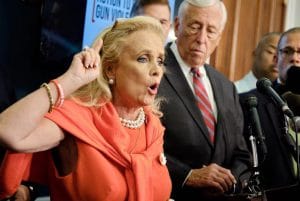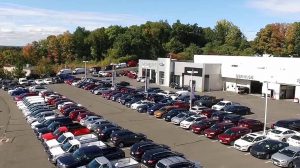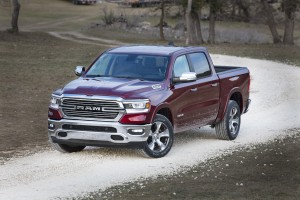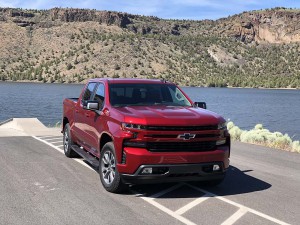
Rep. Debbie Dingell (D-Michigan) is partnering with other Midwest lawmakers to rally support for automakers.
With new vehicle sales last month dipping below levels seen during the Great Recession, and manufacturers posting mounting losses, there appears to be growing interest on Capitol Hill to come up with some sort of assistance program for the auto industry.
A bipartisan group of Midwest lawmakers, including Reps. Marcy Kaptur (D-Ohio), Debbie Dingell (D-Mich.) and Fred Upton (R-Mich.), has begun circulating a letter warning that the “projected economic fallout for the industry is grave,” adding that manufacturers face challengers that could “exceed those of the 2008 financial meltdown.”
During the Great Recession, Congress approved a series of measures to assist the industry, starting with bailouts for General Motors and what was then Chrysler, both of whom were first forced to go through bankruptcy. That was followed by a cash-for-clunkers program encouraging owners to trade in old, gas-guzzling models for newer, cleaner and more efficient vehicles.
(General Motors bucks the trends and turns small Q1 profit.)
Both options appear to be a possibility, though some industry insiders quietly hesitate to line up for any direct bailout program considering the strong pushback that followed the GM and Chrysler bankruptcies.

Ford dealers as well as other automakers are seeing their lots swell with small cars as well as luxury vehicles.
Whether or not such a cash handout would even be needed is far from clear, according to some industry analysts. There is no question that the roughly 50% plunge in April sales, along with the shutdown of North American production now well into month two, has strained industry resources. Ford and what is now Fiat Chrysler Automobiles each lost roughly $2 billion for the first quarter of this year.
On the other hand, General Motors today reported modest earnings of $294 million, and long-struggling Tesla actually managed to deliver its first-ever profit for the January-March quarter. Though GM managed to solidly beat Wall Street’s expectations – earning 62 cents a share, more than twice the 30-cent consensus forecast – the automaker said the coronavirus pandemic still cost it $1.4 billion for the quarter.
The real test will likely come as the second quarter plays out, as it will show most of the cost of the ongoing industry production shutdown. And, even when plants resume operations, they’re expected to start up slowly as everyone gets used to the “new normal,” including more social distancing along the assembly line, more time taken to sanitize facilities, and the use of masks and other personal protection gear.
“It is conceivable, given where we are today, and depending on the extent to which the industry
remains at these very low levels, that we might need to see some priming of the pump,” John Bozzella, the president of the industry trade group, the Alliance for Automotive Innovation, told the Washington Post.
(Fiat Chrysler posts $1.84 billion first-quarter loss.)
What exactly could be in the works is unclear.
“I would not call it a bailout (but) we have been hearing there are discussions around some sort of stimulus package,” Michelle Krebs, a senior analyst for Cox Automotive told TheDetroitBureau.com. “Nothing,” she added, “has taken shape yet.”
As bad as April was, demand has been picking up, Tyson Jominy, a senior analyst with J.D. Power, even suggesting the U.S. auto market is in “recovery.” That said, the research firm doesn’t expect to see anything close to the pre-pandemic sales trendline for months, at best. It is warning that demand for all of 2020 could slip as low as 12.7 million compared to the 17.1 million vehicles sold in 2019. That would be only slightly better than what was seen during the low point of the Great Recession.
Jominy is one of those pointing to a clunkers-style program as one possible way to kick-start demand, but he also questioned whether it would be worth the effort. The original program did generate substantial sales but many experts believe it simply pulled demand ahead by a few months, rather than sparking all-new sales, at a substantial cost to taxpayers.

The Ram pickup helped offset the company’s first-quarter loss. Dealers could soon find themselves short on full-size trucks.
Meanwhile, if such a program were launched now, said Cox Automotive’s Krebs, “One of the things we’re concerned about is that there isn’t a lot of inventory on the ground when they aren’t making anything right now.”
Dealers do have plenty of small cars and luxury vehicles, but are growing increasingly short of full-size pickups. Sales of these high-profit trucks and some SUVs remained unexpectedly strong over the last two months, despite a near nationwide lockdown to reduce the spread of the coronavirus.
(Coronavirus crushes Ford, resulting in Q1 net loss of $2 billion.)
Until production can resume and start replenishing gaps in dealer inventory, cautioned Krebs, a sales stimulus program might not prove effective. Of course, it could focus on high-mileage cars and electrified vehicles, for which sales were slow going into the pandemic lockdown. So, lawmakers and industry leaders would have to decide whether there would be logic targeting vehicles relatively few consumers want. Alternatively, they could hold off on any stimulus program until later this year.

